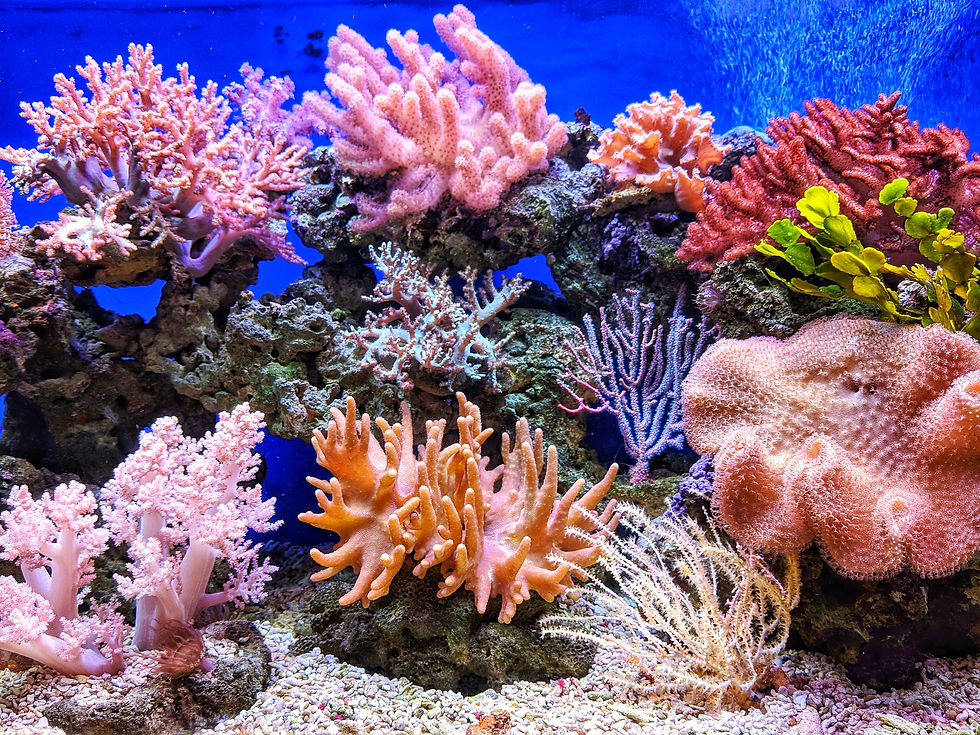The Dying Coral Reefs: Are You Aware?
- Attila Trenka
- Apr 28, 2023
- 3 min read
Coral Reefs
"Covering less than one percent of the ocean floor, coral reefs support an estimated 25 percent of all known marine species." - National Marine Sanctuaries

Are Coral Reefs Important?
Coral reefs are some of the most beautiful underwater ecosystems. While over 100 countries have coral reef within their borders, the majority are located in tropical and subtropical waters along the equator within six countries: Fiji, Australia, Indonesia, Philippines, Papua New Guinea, and the Maldives.
Their eye catching, vibrant colours make them easy to spot on the bottom of the sea. Like most plants, reefs require sunlight because they contain a photosynthetic algae called zooxanthellae, which helps them expand.
The reefs provide shelter for over 400 species of fish, who are each dependent on the reef at some point in their life cycle. For many fish, the reefs are used as a nursery where they can grow in an environment protected from many predators including sharks, which then can save species from going extinct.
The benefits they provide humanity with are also substantial. Firstly, They preserve the natural order by purifying water and air breaking down pollutants. This makes them vital in the battle against climate change. They also provide a buffer, protecting nearby coasts from waves, storms and floods, shielding the nearby communities. Additionally, they are also a source for new medicines that are still being developed, and for many, a source of income due to the tourism that is a result of the reefs being healthy.
These are only some of the reasons that support a strong case for the protection of our remaining coral reefs.
Coral Bleaching
Coral Bleaching occurs when corals are stressed by changes in conditions such as temperature, light, or nutrients. They expel the symbiotic algae and zooxanthellae living in their tissues, causing them to turn completely white.
The leading cause for bleaching is the increase in ocean temperatures caused by climate change. Temperatures of 1 Degree Celsius can result in bleaching. This may not result in the death of the reef as overtime they have been known to recover. That being said, It is important to note that while bleaching does not always mean certain death, many of the reefs have died because of it. In the past 30 years, over 50% of the world's coral reefs have died, with an estimated 90% of the remaining being forecast to perish within the next century .
Bleaching causes large shifts in fish communities, as they are forced to leave behind the vulnerable reef, with many of the young dying while migrating in the open. This then also translates to reduced catches for fishers targeting reef fish. Their disappearance will therefore have economic, social and health consequences.
Sustainable Development Goals (SDGs)
Sustainable Development Goals (SDGs) are an urgent call for action by all countries - developed and developing - in a global partnership. They recognize that ending poverty and other deprivations must go hand-in-hand with strategies that improve health and education, reduce inequality, and spur economic growth – all while tackling climate change and working to preserve our oceans and forests.
SDGs 8,12,13 and 14 are the most relevant goals with relation to the fight to against climate change.
SDG 8 - Decent work and economic growth - Promote sustained, inclusive and sustainable economic growth, full and productive employment and decent work for all.
SDG 12 - Responsible consumption and production - Ensure sustainable consumption and production patterns.
SDG 13 - Climate action - Take urgent action to combat climate change and its impacts.
SDG 14 - Life below water - Conserve and sustainably use the oceans, seas and marine resources for sustainable development.
What can be done?
Limiting global average temperature to below 2 Degree Celsius, above pre-industrial levels and pursuing efforts to limit the temperature increase to 1.5 Degree Celsius, in line with the Paris Agreement and Sustainable Development Goals on climate change, provides possibly the only chance for the survival of coral reefs. While other measures include addressing local pollution, and destructive fishing. These cannot alone save coral reefs without stabilising our greenhouse gas emissions.
Importantly the way of current economic thinking should change. Sustaining and restoring coral reefs should be treated as an asset, and long-term investments should be made for their preservation. Companies need to shift towards lowering their greenhouse gas emissions to enable global temperatures to decrease. Many companies have began implementing solar panels in order to reduce their carbon footprints, this is something that many other companies could do.
Things that you could do:
Consider biking or public transport.
Get involved with sea and coral reef support groups such as reef world.
Eat sustainable seafood.
Conserve water.
Recycle waste properly.
Spread the word!
In conclusion, I hope that reading this article has informed you about coral reefs and the impact that climate change is having. I also hope that it has inspired you to take action. #LessMindless!



Comments